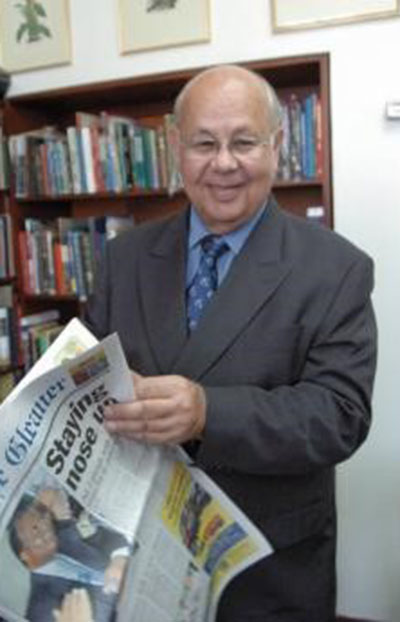(Jamaica Gleaner) Oliver Frederick Clarke, a quintessential media tycoon, Caribbean luminary, humanitarian and banker who had an almost inexhaustible list of accolades, died Saturday at his home at 9:45 p.m. after a battle with cancer. He was 75.
Arguably one of the most influential and renowned media magnates across the English-speaking Caribbean, Clarke managed and chaired the 185-year-old Gleaner Company for four decades, having served as managing director from 1976-2011 and chairman of the media giant (and later 1834 Investments Limited) since 1979.
A central figure in corporate Jamaica, Clarke played a pivotal role in the establishment of the powerful Private Sector Organisation of Jamaica (PSOJ) in 1976 and was later immortalised among its esteemed leadership over the years when he was inducted into the organisation’s Hall of Fame in 1996.
Clarke’s rise to the leadership of the private-sector body came at a time when the then Michael Manley administration of the 1970s embarked on a programme of radical economic and social transformation to achieve a more equitable distribution of the society’s wealth.
Deep divisions emerged within the society when the Government sought to nationalise the ‘commanding heights’ of the economy and began pursuing an independent foreign policy, including relationships with communist countries.
Clarke was among the leaders of corporate Jamaica at the time who perceived the economic policy of the Government as a threat to private enterprise. He took the lead in the course of action that led to the coming together of the private-sector associations, companies, and individuals to establish the PSOJ. His continued leadership role in the PSOJ’s programme to protect the interest of the private sector led to his election as president of the organisation he had helped to found.
In the latter part of the 1970s, the relationship between the Government and The Gleaner became strained. It further deteriorated when Manley, the then prime minister, led a march on the newspaper on September 25, 1979, protesting what he regarded as unfair journalism against his administration. The march ended with a warning from Manley: “Next time! Next time!”
Clarke regarded the prime minister’s action as “bringing pressure on The Gleaner to influence editorial policy or, indeed, to close the company”, and launched a campaign to protect the free press which he regarded as a critical pillar of democracy. In this campaign, the newspaper boss recalls that The Gleaner’s “membership of the Inter-American Press Association and of the Commonwealth Press Association stood us in good ground”. He maintained a dominant presence in both international press organisations and was eventually elected president of The Inter American Press Association.
Well respected and instrumental in public life, Clarke was appointed by the Patterson administration in early 2000 to chair a parliamentary salaries review committee to review the pay received by parliamentarians and to make recommendations. The committee recommended that there should be no increase in the current base pay for members of parliament (MPs).
However, the committee said it did not believe that parliamentarians were overpaid.
The committee had also recommended the construction of a new parliament building owing to the inadequacy of the current structure and that Government should provide and furnish a constituency office for each MP.
A shrewd businessman and entrepreneur extraordinaire, Clarke and the late chairman of Radio Jamaica, J. Lester Spaulding, inked a deal in 2015 to merge the newspaper with the Radio Jamaica Communications Group, arguing that unfavourable local economic conditions were at the heart of the decision to amalgamate the media entities.
In his own words, Clarke reasoned: “You cannot provide independent news unless you are viable. What Jamaica faces is that there are a number of foreign companies coming in and putting up programmes that solicit advertising and you have a lot of businesses that are not making their way. The Gleaner’s interest in this is trying to create an organisation that is viable, can last, and is Jamaican.”
A strong proponent of transparency and accountability in both the public and private sectors, Clarke agitated for legislation to provide increased access to Government information in the late 1990s.
“With the new Companies Act, with new security laws, with stock exchange regulations, companies are being required to provide more and more information, and that is perfectly acceptable. But at the same time, there has to be a requirement that the public sector also provide information so that we can assess their performance,” Clarke said at a Rotary Club meeting in 1999.
Highlighting the difficulties faced by journalists in carrying out their jobs, Clarke said: “It is very difficult to practise journalism in a country where the public and the press have no legal right to access of information”. Three years later, the Government passed the Access to Information Act, giving Jamaicans the legal right to obtain official Government documents, except those exempted under the law.



